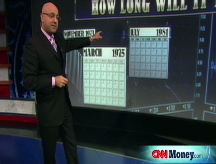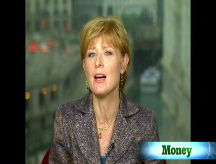Where to hide in the 'bear-cession'
The combination of bleak investor sentiment and a weak economy has sent stocks reeling. But there are values for investors who can stomach volatility.
NEW YORK (CNNMoney.com) -- Welcome to the "bear-cession." Not all bear markets have been caused by or accompany recessions but 2008 is clearly a year marked by both turmoil in the stock markets and the broader economy.
Hence, the term "bear-cession," a phenomenon that Leon LaBrecque, managing partner and founder of LJPR, LLC, a Troy, Mich.-based investment firm with over $300 million in assets, wrote about for his firm's blog Monday.
Simply put. It's ugly. And Monday's huge sell-off was a perfect microcosm for the year.
The rout in stocks appeared to be led mostly by economic concerns: the latest monthly data about manufacturing activity and construction activity painted an increasingly bleak picture of the economy.
Investors were also skeptical that better-than-expected Black Friday holiday shopping sales would actually carry over into the rest of December.
Finally, the National Bureau of Economic Research finally confirmed what everyone not living under a rock already knew: the economy is in a recession.
Faced with all this dreary news, the market sold-off heavily. The Dow plunged 680 points. And the S&P 500 plummeted nearly 9%. Almost nothing escaped the Wall Street carnage.
Only two (two!) stocks in the S&P 500 finished Monday in positive territory. And one of them, car dealer AutoNation (AN, Fortune 500), barely inched into the black. It posted a measly gain of 1 penny per share, or 0.1%.
For the year, shares of only eleven of the companies in the S&P 500 are up. And of that group, three of them are higher simply because they are in the process of being acquired by other companies - Rohm & Haas (ROH, Fortune 500), which was the only other winner Monday, UST (UST) and Barr Pharmaceuticals (BRL).
Two more, discount retailers Wal-Mart (WMT, Fortune 500) and Family Dollar Stores (FDO, Fortune 500), are thriving precisely because the economy stinks.
This market has been so abysmal that not even typical safe havens are doing well. Utility stocks, which tend to perform well in times of tumult because of attractive dividend yields, are down 34% on average.
And gold, which many investors flee to in times of economic chaos, has lost its luster as well. The price of gold is now hovering at around $780 an ounce, down 7% so far this year and off 23% from its mid-March high of over $1,000 an ounce.
But guess what? Some money managers are taking the market volatility in stride and say that they are cautiously wading back into stocks, even shares of some of the most beaten-up firms.
"The best advice we can give people is to not get caught up in the day to day manias. We are at the tail end of a panic bubble," said David Katz, manager of the Matrix Advisors Value fund. "If you have any sort of time perspective, you want to use days like Monday to buy wonderful businesses at wonderful prices."
Katz said that three companies in particular that he thinks have been oversold and that he's been buying more of are personal computer giant Dell (DELL, Fortune 500), home security firm Tyco International (TYC) and online job recruiting firm Monster Worldwide (MNST).
LaBrecque said he's even been slowly wading back into financial stocks that he thinks will bounce back and are not at risk of crippling losses. Among that group are regional banks Comerica (CMA) and U.S. Bancorp (USB, Fortune 500) as well as Bank of America (BAC, Fortune 500).
"I'm completely baffled by the way the market is valuing some banks," he said.
Ted Parrish, co-manager of the Henssler Equity fund, agreed that the sell-off in many stocks has been overdone.
He said Monday's carnage probably had more to do with investors taking profits after a huge market surge in last week's holiday-shortened trading session and that the confirmation of a recession was not really a good excuse to dump all stocks.
"The economic news Monday was not that much of a surprise," Parrish said. "There are lot of companies trading at good prices. Sooner or later, people will begin to realize that."
Along those lines, Parrish said he has recently been buying shares of companies that he believes have solid growth prospects over the next few years.
He said he bought Vulcan Materials (VMC), a manufacturer of concrete, asphalt and other construction materials, since he thinks that company will benefit from the expected increase in infrastructure spending by the administration of President-elect Barack Obama.
He also said he bought Boeing (BA, Fortune 500) shortly before the company's machinist strike ended last month because he believes the company's new 787 Dreamliner plane is a "once in a 100-year product."
LaBrecque added that he also thinks that some energy stocks are looking attractive now because he does not believe oil prices will stay this low for long. With that in mind, he said he's lately been buying Royal Dutch Shell (RDS.B).
He said he's also been purchasing shares of companies with healthy dividends outside of the banking sector with relatively stable businesses.
One example is consumer products giant Kimberly-Clark (KMB, Fortune 500), which pays a dividend that yields 4%. LaBrecque jokes that the company, which makes Kleenex tissues and Scott paper towels, is known for paper that isn't toxic -- a claim most banks can't make.
It's obviously tough to stay optimistic in a market that is dominated by awful headlines almost every day. But Katz said that long-term investors will eventually regret it if they are frightened by the market's daily gyrations now.
"There is a great likelihood that in two years, people will look back and kick themselves for not buying at these prices," he said. ![]()




